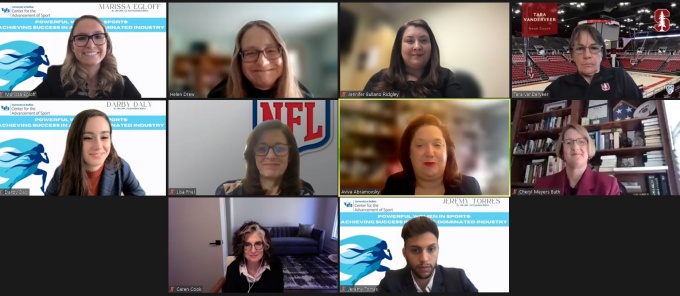
Women leaders in the sports industry share career advice
The passion was evident and the wisdom was abundant in a recent UB School of Law forum titled “Powerful Women in Sports: Achieving Success in a Male-Dominated Industry.”
The Feb. 1st Zoom forum, organized by the UB Center for the Advancement of Sport and the student-run Buffalo Sports and Entertainment Law Society, drew on the hard-won experiences of five women working at the highest levels of professional and collegiate athletics. The discussion ranged from today’s hot-button sports issues to how aspiring lawyers might gain a foothold in the sports industry.
“It’s so much more competitive now than when I got into it,” said Jennifer Bullano Ridgley, vice president of communications for the National Hockey League’s Pittsburgh Penguins. “You have to take advantage of every opportunity you get. There’s a fine line between being confident and persistent and overstepping boundaries. But when you’re young and you’re pursuing this, you have to find out what makes you stand out.”
The work relies on every aspect of a lawyer’s toolkit. “Legal training in contracts is a no-brainer,” said Cheryl Meyers Buth, an attorney and agent for National Basketball Association players. “That comes in handy all the time. When players move from city to city, they need real estate advice. They want investment advice…having a general business background is also good experience. … As an agent, you don’t necessarily have to be a lawyer. But you do have to be a curious person, you do have to want to learn different things, and you have to love people, because that’s what you do all day, talk to people. If you find them interesting, that makes your job easy.”
“There are all different areas you can work in for a sports league or a sports team,” said Lisa M. Friel, senior vice president for investigations at the National Football League. “Mine is conduct-related, so having been a prosecutor for years obviously made a difference for me. I want to be proactive, so I go team to team and tell them stories I have learned in an effort to keep them out of trouble. … I tell students all the time, when they say they want to be in the sports world as a lawyer, go out and learn some aspect of the law, whatever you’re interested in. If you go to a firm, figure out what you really like to do and learn that, and then you can do anything like that for a sports league or a sports team.”
Other Sports Law Forums
Tuesday, March 1, 2022
NFL Politics: A Play-by-Play
featuring Ken Belson,
NFL Correspondent for The New York Times
Thursday, March 3, 2022
The State of Baseball featuring:
Jonathan A. Dandes ’74 (BS), Corporate Vice President, Rich Products Corporation; Former President, Rich Baseball Operations/Bisons Baseball
Leo Dandes ’10 (JD), Vice-President/Financial Crimes Division, HSBC; Head Baseball Coach, AAA/BA; Former Head Baseball Coach, D’Youville University Saints
Asked to describe a typical day in her job as deputy general counsel for legal and business affairs with the NBA’s Atlanta Hawks, Caren M. Cook ’90 said there’s no such thing. “Every day is unique,” she said. “The business is so fluid. Things are coming up all the time, and you’re dealing with so many different things on a daily basis.” For example, she said, many pro teams are building new arenas or pursuing real estate development. “There’s a lot of financing as it relates to that,” she said. “There are privacy issues. There are compliance issues. You’re educating your staff. You really get to touch all aspects of the organization, everything from human resources to sponsorship to operating the arena, everything from slip-and-falls to Americans with Disabilities Act questions. Every day is different. It’s really an enormous breadth of things that arise, but it makes your day really interesting and it’s never dull. I’m always learning, and I really like that.”
One cutting-edge issue, noted Tara VanDerveer, longtime coach of the Stanford University women's basketball team and all-time winningest coach in women's college basketball, is the recent court ruling that allows college athletes to earn money on the use of their name and likeness, such as in video games. “It’s a whole new world,” VanDerveer said. “It’s very exciting, but it’s very fast-paced. There are some times when I’m glad I’m at the end of my career and I can see the clubhouse, because it’s very challenging for young athletes to manage their sport, their academics and now they really have to be a business person, too. Maybe they have to hire an agent. The pressures are real; we see a lot of mental health issues in sports that are finally being talked about.
“There’s so much more to sports than just throwing the ball out there. It's a very big business.”
The event was co-sponsored by UB’s Office of Inclusive Excellence, the UB Gender Institute and the UB Law Alumni Association.